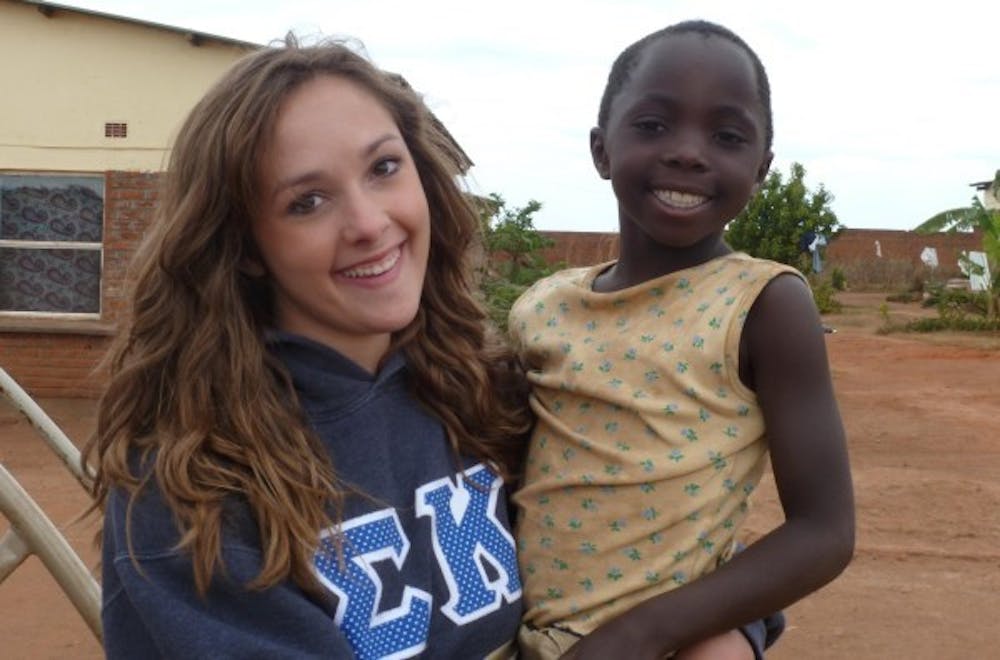Four years ago, then freshman Adrienne Shendler was handed an envelope with a card inside that read "Sigma Kappa would like to invite you to be a member."
Surrounded by 300 girls on LaFollette Field for Bid Day, the day when sororities officially invite in new members, Shendler immediately ran to the group of Sigma Kappa sisters and pulled on the navy blue shirt that represented her new sorority.
"I remember thinking, 'this is something I've always wanted, to be in a sorority,'" Shendler said.
As the Sigma Kappa vice president of new member education, Shendler is now on the other side of Panhellenic recruitment. For the past several weeks, she has been brainstorming themes, designing T-shirts and ordering bags, all for the new members that her sorority will receive on this year's Bid Day.
Senior public relations major Sharisse Horel and her sorority, Phi Mu, have been preparing for three weeks for recruitment. They've been rehearsing everything from questions to ask and answers to know to perfecting a pop-music song mash-up that the sororities will be preforming for incoming recruits. While Horel has come a long way from her own bid day, the Phi Mu president still has the recruitment week jitters.
"We're just as nervous. Here's all these girls, saying 'We hope they like us,'" Horel said. "But we hope they like us, too. We don't want anyone walking away from us saying 'I just can't stand that group of women.'"
Shendler said it's accurate to say recruitment week is almost like speed dating. It is composed of orientations and several rounds of potential recruits talking to sorority members to gauge the best fit between girl and chapter.
"You're looking for some people that you will be spending your college career with," Shendler said. "And it goes beyond that. They are going to be there for you for the rest of your life."
Horel remembers at first feeling a long way from her home in Chicago and then, after recruitment week, automatically having 90 friends.
"All of a sudden, girls wanted to have lunch with me and get to know me," Horel said. "It became a family away from home."
While Horel would have found friends without joining Phi Mu, her sisters have impacted her life in ways that other groups might not have.
"There's different standards held by my sisters," Horel said. "I have to maintain a certain grade point average, pay my bills on time, act appropriately on campus - and I have all of these women holding me accountable, where instead, I might've gone out with a group of friends and partied when I should've been studying."
Sorority life includes the rituals, values and traditions that impact members' daily lives. Phi Mu is centered around love, honor and truth, which is expressed in private rituals unique to each chapter.
"I made a vow to act a certain way, to uphold certain values," Horel said. "Every day, I live by my ritual."
Shendler, likewise, is largely impacted by her identity as a Sigma Kappa sister. She met her boyfriend of three years through her sorority and her roommate is a Sigma Kappa sister.
Even when she was in Malawi, Africa, this past summer during an immersive program aimed at tutoring and reading with local children, she made sure that the small amount of Internet access she had was spent staying in touch with her sisters.
For sorority members, special occasions are commonly marked by a greek life tradition.
"My best friend and I exchange paddles for Christmas, birthdays, everything," Shendler said. "When you'd normally get a card from a friend, instead you get a big piece of wood decorated especially for you."
However, being in a sorority doesn't only change the relationship between member and member, but everyone else's perception. When Horel mentions being a sorority member president, she gets shocked reactions.
"They're like 'you're not the sorority girl type.'" Horel said. "And I'm like, 'what do you mean? I get good grades and participate in charity work. Those are things that are a part of being in a sorority.'"
Shendler agreed there are misconceptions about what sorority life looks like. The cookie-cutter stereotype that's depicted in movies and TV doesn't match up to her day-to-day life. She enjoys crafting, baking and working at a toy store in her hometown of Richmond, Ind. She has a collection of more than 200 children's books, not a series of scandalous pictures or jumble of liquor bottles. As students walk into recruitment week, they enter into, as Shendler described, "something bigger than yourself."
"It's not just Ball State. It's not just Muncie, it's bigger than that," Shendler said. "You become a part of something that is across the nation."



